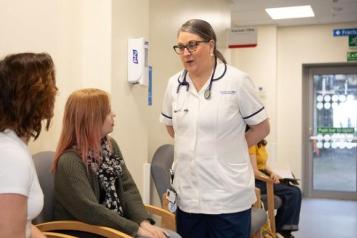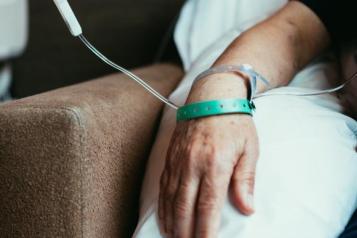AI and algorithms in healthcare – what are the risks and opportunities for the NHS?

Men in England continue to face worse health outcomes than women. They face higher rates of heart disease, cancer and suicide, which is one of the leading causes of death for men under 50. Healthwatch England’s recent research found that these inequalities are reinforced by gaps in awareness, understanding, and engagement with health services.
Read the report
As social media and artificial intelligence (AI) become everyday sources of health advice, men are increasingly exposed to online misinformation that can harm their wellbeing.
This shift brings new risks, but also a vital opportunity for the NHS to improve health literacy and strengthen its presence online.
Where do men turn for advice on how to stay healthy?
When asked where they turn for information on staying healthy, the most common source was the NHS website (48%), printed NHS leaflets (30%); and NHS 111 (23%).
Men also reported getting information on how to stay healthy from:
- TikTok, Instagram and YouTube (18%);
- Healthwatch services, (11%);
- AI tools (nine percent).
A growing digital divide in men’s health
Our polling shows that there is a stark digital divide in men’s health. Younger men and men from ethnic minority backgrounds are more likely to seek information on staying healthy from sources outside the NHS.
For instance, 30% of Black men reported relying on Healthwatch for information on how to stay healthy.
Younger men and men from ethnic minority backgrounds were also far more likely than other groups to use social media, AI tools and online influencers for advice.
For example, 31% of men aged between 18 –24 told us they use social media for information on staying healthy. This figure drops slightly to 28% of men aged 25-34 and drops significantly to only 13% of men aged 40- 74.
Similarly, 27% of men from ethnic minority backgrounds said they use social media for information on staying healthy compared to 16% of white men overall.
When it comes to AI, 18% of men from ethnic minority backgrounds said they use AI for the same purpose, compared to only seven percent of white men.
Overall, for nine percent of all men, AI tools are now a regular source of information of staying healthy. This compares to seven percent for women.
When algorithms become health advisers
Though online content can be instant and engaging, it’s not always accurate. AI systems don’t always understand an individual’s full medical context, and social media platforms are generally designed to reward attention rather than accuracy. When these become the first places people look for advice about their bodies or symptoms, misinformation can spread quickly and potentially cause harm.
For many men, possibly including those that are reluctant to visit their GP, these platforms can seem like safe, anonymous spaces to seek advice. But without the skills to distinguish reliable information from commercial hype or misinformation, they risk being misled in ways that can seriously affect their health.
Recent findings from Healthwatch Leeds highlights the significant differences in how young people interpret and evaluate online health information, revealing varying levels of health literacy.
When asked how they decided if they could trust information on social media, young people in Leeds said:
‘Comment sections and depending on the creator of the posts (if they are trusted)’ (Male aged 13-16)
‘If it's by a business account or sounds like me [that] would make sense.’ (Young person aged 21-24)
‘Trusted source and fact checking if I’m not sure’ (Male aged 13-16)
Recent news stories in the media have shown how easily misinformation can escalate when people do not have the health literacy skills to identify harmful health information:
- TikTok influencers have been promoting unlicensed weight-loss drugs such as retatrutide, fueling a black-market trade in the UK.
- Social media algorithms continue to amplify harmful messages about masculinity, fitness and mental health, with some influencers promoting harmful health advice such as the use of steroids, diet pills and so called ‘smart drugs’.
- In the United States, a lawsuit has raised concerns about an AI chatbot that appeared to encourage a vulnerable teenager’s suicide.
An opportunity for the NHS
If men are already seeking health information online, the NHS needs to meet them there. Healthwatch England has recommended creating a dedicated men’s health section on the NHS website, offering clear, accessible information about key conditions, screening programmes and symptoms to watch for.
However, 18% of men aged 25-34 told us that they’d be more likely to make lifestyle changes based on information from social media experts including content from influencers. So, the NHS’s role should go further.
By developing a stronger and more relatable presence on social media, it can make sure accurate, evidence-based advice appears in the same feeds where misinformation spreads. Working with trusted public figures, sports organisations and community leaders can help make these messages more relevant and appealing.
Equally important is building men’s digital health literacy. Men want more information about how to stay healthy, but many lack the skills to judge what’s reliable online. Campaigns that help people fact-check content, recognise genuine NHS information and spot misleading claims would give men the confidence to make safer choices about their health.
Men want more information through social media, and they also want the skills to access and interpret this information.
‘More YouTube videos in various languages like Urdu, to improve our knowledge about mental health, cancer etc. [We] also need more help to improve digital skills of elders in the community’ (Mixed Asian Male aged 46-55) Healthwatch Bucks, Men’s Health Survey
We call for digital responsibility
As AI technology advances and social media continues to dominate how people access information, the line between helpful advice and dangerous misinformation is becoming increasingly blurred. For men who are already hesitant to seek formal healthcare, this creates a serious risk.
To address this, two things must happen:
- First, health services should communicate more effectively online, using the platforms and formats that men already engage with.
- Second, men need the tools and understanding to assess digital information critically, so they can navigate AI and social media safely.
Healthwatch England’s research makes it clear that men are not rejecting the NHS as a source of information. However, the NHS needs to be more visible, responsive and relatable in the digital spaces they use every day. By doing so, the NHS can turn a growing online risk into an opportunity to improve men’s health and wellbeing.
About the poll
Savanta surveyed 3,575 men aged 18+ living in England between 13th - 27th June 2025. Data were weighted by gender, age, region and SEG (Social Economic Grade).


